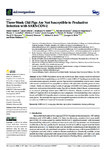Three-Week Old Pigs Are Not Susceptible to Productive Infection with SARS-COV-2
| dc.contributor.author | Haddock, E | |
| dc.contributor.author | Callison, J | |
| dc.contributor.author | Seifert, SN | |
| dc.contributor.author | Okumura, A | |
| dc.contributor.author | Tang-Huau, T-L | |
| dc.contributor.author | Leventhal, SS | |
| dc.contributor.author | Lewis, MC | |
| dc.contributor.author | Lovaglio, J | |
| dc.contributor.author | Hanley, PW | |
| dc.contributor.author | Shaia, C | |
| dc.contributor.author | Hawman, DW | |
| dc.contributor.author | Munster, VJ | |
| dc.contributor.author | Jarvis, Michael A | |
| dc.contributor.author | Richt, JA | |
| dc.contributor.author | Feldmann, H | |
| dc.date.accessioned | 2022-02-25T13:33:41Z | |
| dc.date.available | 2022-02-25T13:33:41Z | |
| dc.date.issued | 2022-02-10 | |
| dc.identifier.issn | 2076-2607 | |
| dc.identifier.issn | 2076-2607 | |
| dc.identifier.other | 407 | |
| dc.identifier.uri | http://hdl.handle.net/10026.1/18854 | |
| dc.description.abstract |
<jats:p>As the COVID-19 pandemic moves into its third year, there remains a need for additional animal models better recapitulating severe COVID to study SARS-CoV-2 pathogenesis and develop countermeasures, especially treatment options. Pigs are known intermediate hosts for many viruses with zoonotic potential and are susceptible to infection with alpha, beta and delta genera of coronaviruses. Herein, we infected young (3 weeks of age) pigs with SARS-CoV-2 using a combination of respiratory and parenteral inoculation routes. Pigs did not develop clinical disease, nor macroscopic or microscopic pathologic lesions upon SARS-CoV-2 infection. Despite occasional low levels of SARS-CoV-2 genomic RNA in the respiratory tract, subgenomic RNA and infectious virus were never found, and SARS-CoV-2-specific adaptive immune responses were not detectable over the 13-day study period. We concluded that pigs are not susceptible to productive SARS-CoV-2 infection and do not serve as a SARS-CoV-2 reservoir for zoonotic transmission.</jats:p> | |
| dc.format.extent | 407-407 | |
| dc.format.medium | Electronic | |
| dc.language | en | |
| dc.language.iso | en | |
| dc.publisher | MDPI | |
| dc.subject | SARS-CoV-2 | |
| dc.subject | young pigs | |
| dc.subject | infection | |
| dc.subject | replication | |
| dc.subject | transmission | |
| dc.subject | disease | |
| dc.subject | pathology | |
| dc.title | Three-Week Old Pigs Are Not Susceptible to Productive Infection with SARS-COV-2 | |
| dc.type | journal-article | |
| dc.type | Journal Article | |
| plymouth.author-url | https://www.webofscience.com/api/gateway?GWVersion=2&SrcApp=PARTNER_APP&SrcAuth=LinksAMR&KeyUT=WOS:000762585400001&DestLinkType=FullRecord&DestApp=ALL_WOS&UsrCustomerID=11bb513d99f797142bcfeffcc58ea008 | |
| plymouth.issue | 2 | |
| plymouth.volume | 10 | |
| plymouth.publication-status | Published online | |
| plymouth.journal | Microorganisms | |
| dc.identifier.doi | 10.3390/microorganisms10020407 | |
| plymouth.organisational-group | /Plymouth | |
| plymouth.organisational-group | /Plymouth/Faculty of Health | |
| plymouth.organisational-group | /Plymouth/Faculty of Health/School of Biomedical Sciences | |
| plymouth.organisational-group | /Plymouth/REF 2021 Researchers by UoA | |
| plymouth.organisational-group | /Plymouth/REF 2021 Researchers by UoA/UoA01 Clinical Medicine | |
| plymouth.organisational-group | /Plymouth/Research Groups | |
| plymouth.organisational-group | /Plymouth/Research Groups/Institute of Translational and Stratified Medicine (ITSMED) | |
| plymouth.organisational-group | /Plymouth/Research Groups/Institute of Translational and Stratified Medicine (ITSMED)/CBR | |
| plymouth.organisational-group | /Plymouth/Users by role | |
| plymouth.organisational-group | /Plymouth/Users by role/Academics | |
| dc.publisher.place | Switzerland | |
| dcterms.dateAccepted | 2022-02-07 | |
| dc.rights.embargodate | 2022-2-26 | |
| dc.identifier.eissn | 2076-2607 | |
| dc.rights.embargoperiod | Not known | |
| rioxxterms.versionofrecord | 10.3390/microorganisms10020407 | |
| rioxxterms.licenseref.uri | http://www.rioxx.net/licenses/all-rights-reserved | |
| rioxxterms.licenseref.startdate | 2022-02-10 | |
| rioxxterms.type | Journal Article/Review |


